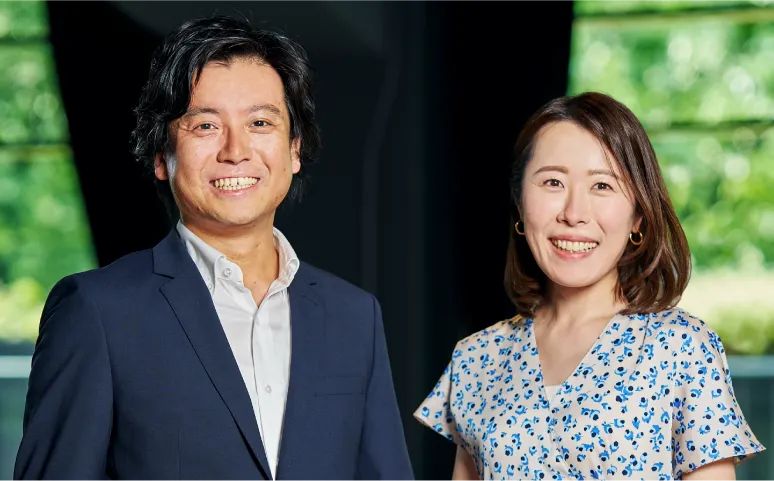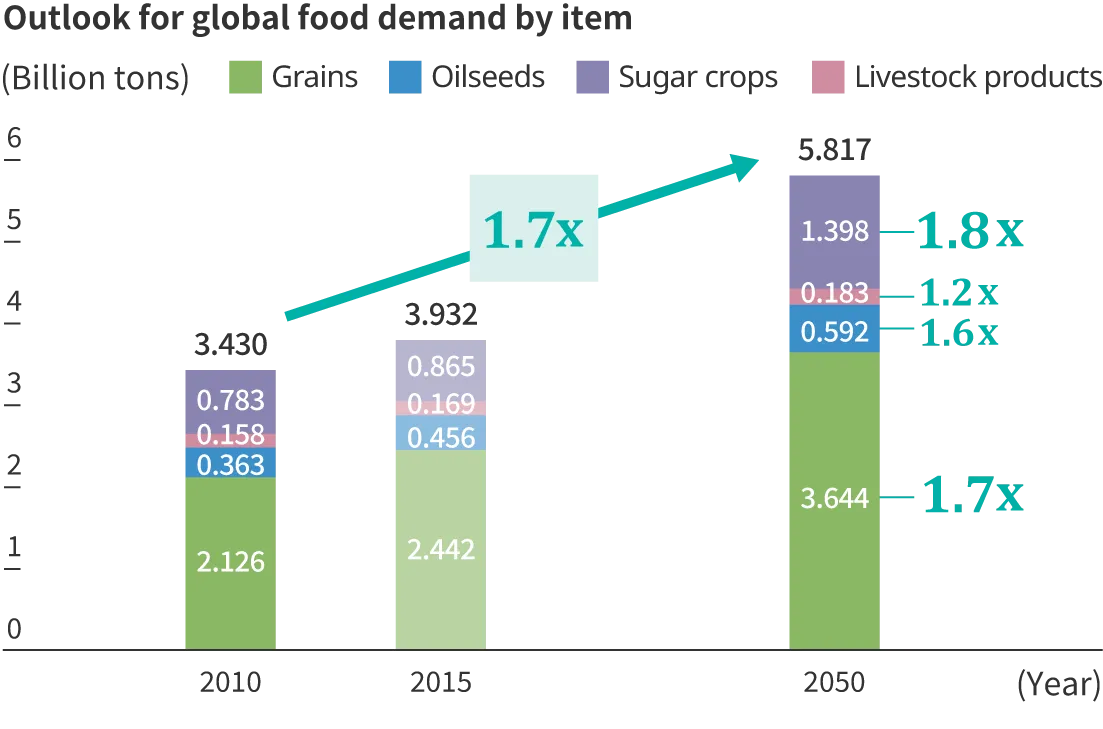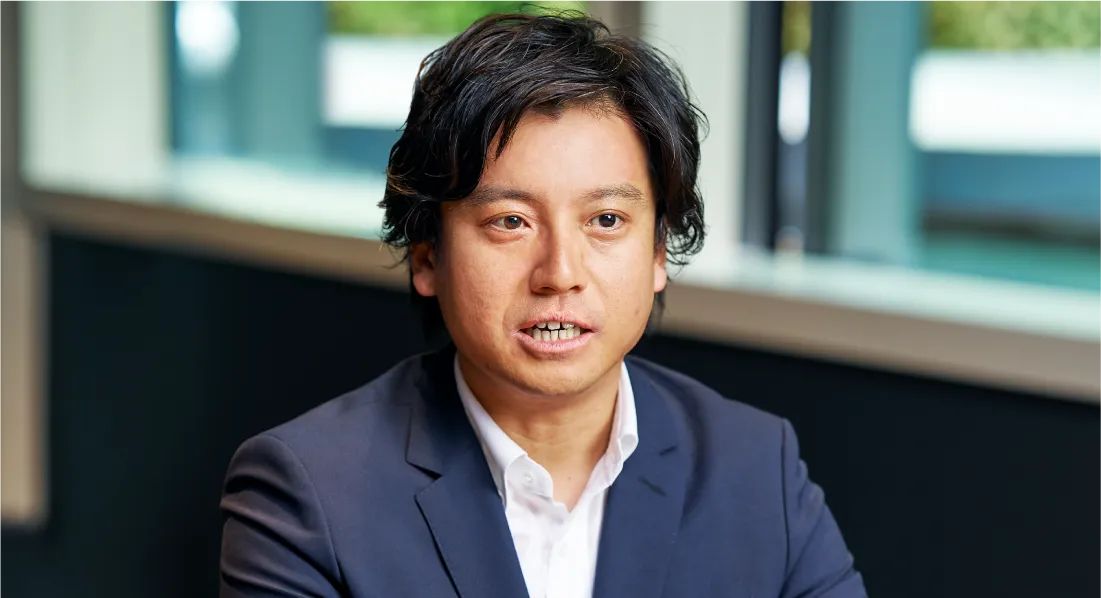Interview Key Social Issue | Improvement of living standard
Next-generation agribusiness
Realizing sustainable food production through agricultural innovation
As the world's population growth and climate change become more critical, there is a need to eradicate hunger, ensure a stable food supply, and improve nutritional conditions. To achieve this goal, it is essential to establish a sustainable food production and supply system that balances higher agricultural productivity with less environmental impact.
Sumitomo Corporation has been engaged in agribusiness globally for roughly 70 years. Seeing the current social challenges in food production and supply systems as a medium- to long-term challenge, the Company newly established the Agri-Innovation Department in April 2022. The department is responsible for business development to promote new technologies and solutions that will support the future of agriculture. We talked with two employees active on the front lines of agriculture about Sumitomo Corporation's pursuit of realizing sustainable next-generation agriculture and how they can leverage the knowledge the Company has cultivated in the agribusiness over the years.
Interviewees

Keisuke Okada
Agri-Innovation Department
Joined the Company in 2008. After working in the mining and construction equipment sales business and supply chain management for construction equipment plants at the Construction & Mining Systems Division, participated in new business development at the African subsidiary for approximately three years starting in October 2013. After returning to Japan, he joined a team business development in the field of precision agriculture. He later joined the Agri-Innovation Department, which was established in April 2022, and is now responsible for developing new businesses in the field of smart farming.
Aya Kuroe
Agri-Innovation Department
Joined the Company in 2008 and worked in the Basic Chemicals & Electronics Division, where she worked in plastic raw material and semiconductor material trade. In July 2020, she was transferred to the Energy Division, where she was involved in the launch of a carbon credit-related business. In April 2022, she joined the new Agri-Innovation Department and is currently involved in new business development in the clean farming field, including carbon credit generation.
Why
Seeking agriculture and food production that addresses increasing food demand and climate change
The environment surrounding agriculture and food production has become even more severe in recent years. Globally, the demand for food is increasing as the world's population grows and dietary habits change. At the same time, however, numerous issues are emerging as barriers to increased food production. These include changes in crop growing conditions caused by climate change, increased droughts and flooding, and soil erosion. Looking specifically at Japan, there are a mountain of social issues such as the declining population of farmers, the shortage of successors, and the increase in fields and rice paddies that have been abandoned and are no longer cultivated. A sustainable food production system requires new technologies and solutions that improve agricultural production, automate and reduce the labor required for the work, and reduce the environmental footprint. Also, to resolve the social issues, these innovations must be put into practical use and be widely accessible.

What&How
Developing new businesses from a medium- to long-term perspective with the agribusiness as the focus of the next-generation growth strategy
Since launching imports and exports of crop protection products and fertilizers approximately 70 years ago, Sumitomo Corporation has promoted businesses that contribute to the sustainable development of agriculture all over the world and the stable supply of food. This includes manufacturing and distributing such products and global development of the agricultural input & service business, including the sales of agricultural equipment. Through these long-established businesses, we have built a global sales network and value chain that covers the major agricultural regions of the world. At the same time, we have gained the ability to address the specific needs and challenges of our customers, the producers in each region, through our direct sales system allowing immediate access to them. These are some of the major strengths of our agribusiness.
As agriculture and food production are gaining greater attention as challenges related to human sustainability and food security, Sumitomo Corporation has positioned its agribusiness as one of the next-generation growth fields in its medium-term management plan SHIFT 2023. In the Agribusiness Strategic Business Unit (SBU), the plan is to grow after-tax profit (excluding one-off profits) from ¥16.5 billion, where it is now, to more than ¥40.0 billion by FY2030.
Based on this plan, the Agri-Innovation Department is working to develop smart farming, which aims for highly efficient food production utilizing information and communications technology (ICT); clean farming, which pursues food production with a small environmental footprint; and next-generation food production, which leverages genome and culture technologies.
Pursuing the practical application of sustainable next-generation agriculture utilizing ICT, biotechnology, environmentally friendly technologies, and more
Smart farming is a business for maximizing yield, improving quality, and automating and streamlining agricultural work. This involves utilizing cutting-edge information technology such as IoT, ICT, and AI analysis to aggregate and analyze various agricultural information, including operational data from agricultural equipment, farming records, and soil and weather data, and growth analysis based on satellite and aerial images. We are also focusing on the contract farming business to promote these advanced agricultural technologies and solutions. As part of this, we have invested in Nileworks Inc., a company that develops and sells automated drones for agricultural use in Japan, as well as AI services which provide growth and disease diagnosis based on image analysis. In the domains where we are looking into new businesses, we are working to spread precision agriculture utilizing automation technology and to develop support services for emerging countries and small farmers, such as analysis and software subscription services and mobile payment services for contract farming and agricultural input distribution.
Regarding clean farming, the focus is placed on regenerative agriculture, where crops are cultivated while storing CO2 in the ground by increasing organic matter in the soil to preserve and improve farmland and ecosystems, thereby reducing the greenhouse gas emissions from agriculture. We also aim to achieve sustainable business by trading the carbon credits generated. In addition, to reduce greenhouse gas emissions from livestock and dairy farming, we are putting effort into developing businesses using feed additives that are effective in reducing methane gas contained in cattle belches. Another example of our projects includes developing insect-derived proteins as alternative proteins for livestock and aquaculture feed as well as pet food.
Next-generation food production is an initiative to build a circular food production system using next-generation technologies to support plentiful diets. Specifically, we seek to develop highly functional agricultural product varieties and bio-agricultural chemicals using genome editing technology, to put edible oils and fuel generated from algae to practical use, and to develop and produce Cell-based meat and Plant-based meat.

Sumitomo Corporation employees pictured with local partners and farmers in India working toward sustainable agriculture
Pursuing synergy not only through collaboration with the existing agribusiness but also with Sumitomo Corporation's wide range of other businesses
Progress varies depending on the project, but our policy is to set milestones for each project and steadily achieve them. Even for projects that have already shown results through proof of concept, there is a possibility that cost could become a major challenge when it comes to actual commercialization. As such, for businesses with high entry costs, such as for machineries and equipment, we aim to build a business model that can be widely used by small and medium-scale producers who have difficulty when it comes to the initial investment. Offering subscription services is one of the ideas.
Furthermore, when developing new businesses, we collaborate not only with existing businesses in the Agribusiness SBU but also with other SBUs and internal and cross-organizational teams, such as the Green Chemical Business Development Department and the Energy Innovation Initiative (EII),along with regional bases and group companies. We believe that being able to contribute to the realization of sustainable next-generation agriculture and food production systems while pursuing synergy with various businesses within the company is a unique strength of Sumitomo Corporation.
Going forward
Sharing a vision with our partners and solving challenges one by one

In the smart farming project, it is extremely important to have a collaborative relationship with many partners. This includes not only manufacturers of equipment, such as farm machines and drones, and IT vendors but also the agricultural producers who are the users, the food processing companies who are the consumers of the crops, and distributors. It can take six months to more than a year for proof of concept at farms to yield results. Therefore, I believe it is crucial that we develop businesses with partners who share the same sense of urgency to make agriculture more sustainable from a long-term perspective and ensure that projects do not come to a halt during the experimentation phase. I go about my work with the hope that Sumitomo Corporation can play a role in helping to achieve this. Furthermore, we have offices not only in Japan but also in various parts of the world, including Asia, Africa, Europe, and South America. In those locations, we have people who are passionate about contributing to the development of agriculture and society in their respective countries. I hope to create new businesses that will support the next generation of agriculture and food production together with these colleagues.
Developing a business model capable of turning reduced environmental impact in agriculture into profit

The mission of the Agri-Innovation Department is “Innovation for the Earth.” I am in charge of clean farming, and am convinced that it is an essential initiative for the future of agriculture and a business of great social significance. However, because reducing the environmental impact of agriculture does not immediately translate into profit for the producers under the current circumstances, I feel that it is crucial to find a balance between reducing environmental impact and making it successful as a business. For that reason, we are committed to establishing a business model to monetize clean farming by such means as introducing mechanisms to convert environmental value into economic value, including carbon credit generation, and pursuing cost reductions. Moreover, as individual commercialization by each producer is not efficient, my hope is to coordinate businesses by collaborating with various industries and regions, working together to generate greater greenhouse gas reduction effects and bring about a social impact.

